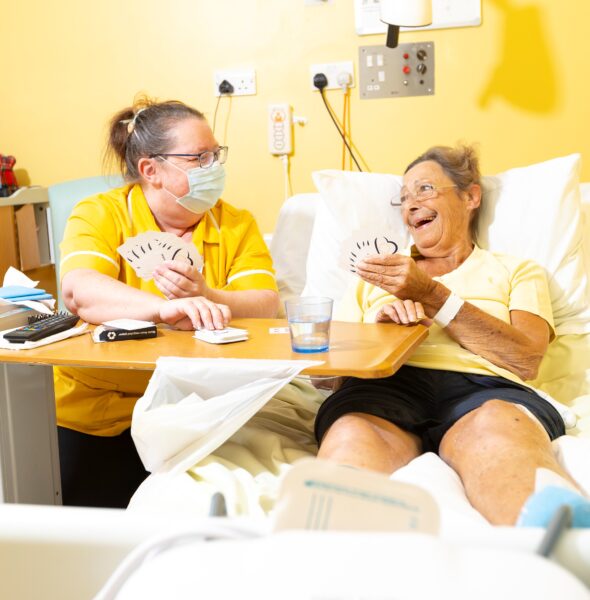Menstrual flooding, the menopause and major change

An elected hysterectomy left integrated therapy assistant Libby Darling with horrendous symptoms but her courage in speaking out paved the way for menopausal women at Kent Community NHS Health Foundation Trust (KCHFT).
The first time it every happened to me is etched in my memory. Out in the community, working in a primary school. I was discussing a plan of action with a headmistress when suddenly there was a dam-busting sensation in my underwear.
I could feel a flood of warm blood emerging below, but was frozen in embarrassment. I couldn’t even croak that I needed the loo and was forced to grimace through the conversation before shuffling to the nearest facilities.
Even someone like me, a feminist, who has worked for the NHS for the best part of 15 years struggled to admit the issues of heavy menstruation and the impact it had on my life.
During my periods, I would have to leave the house ready for battle – not just a laptop bag, but the equivalent of a modular weight-loading army knapsack. Industrial sized sanitary pads, thick bath towels, changes of clothing, tissues, wipes... even nail brushes.
Alongside the embarrassment there was my plummeting iron levels, low self-esteem and my suffering work. Something had to give. I didn’t take the decision to have an elective hysterectomy lightly, but in many ways, it was my only option.
I went through with the operation in December 2012. In five years, said the surgeon, the menopause would kick in. Almost to the day, five years later, there it was. And it didn’t just kick me – it knocked me right out.
I was instantly hit with brain fog, mood swings, weight gain, hair loss, thin skin and emotional dysregulation. And all of this while trying to parent teenage children, look after three dogs and keep a marriage afloat.
Because my birth mother (I am adopted) had breast cancer, there were question marks over the use of Hormone Replacement Therapy (HRT) so I resorted to natural ways of coping like eating well (which I always have done), building muscle in the gym and taking supplements. It helped, but the symptoms still reared their ugly head.
What got me the most was the mental fug of the menopause. I’ve always thought of myself as a sharp, smart cookie but I’d forget appointments and had to write everything down in minute detail.
I was also an emotional wreck, crying at the drop of a hat. At one point, I was hauled up in front of management for being incompetent. In the NHS we love to help people, but for the first time in my life, I felt just plain useless.
Back then, reasonable adjustments didn’t really exist. I remember searching the intranet for help and all that popped up was a sexual health clinic.
On my next team meeting, however, we were joined by what was called back then a ‘Change Maker’, someone who was trying to work closely on improving staff morale and engagement.
‘What can I do to help you feel better at work?’ he asked.
The force of years of suffering seem to propel me to my feet and I almost shouted: ‘We need help with the menopause!’. A round of applause ensued. This issue was a big one, in a workforce made up of 87 per cent women.
It was after that day that an early form of a network began. It’s a great feeling to know I played some part in in leading the way to producing the important Menopause Network of today, that offers not just chat and advice, but solidarity and measurable, tangible changes to working practices.
These changes include reasonable adjustments, small changes to everyday working life. Those associated with the menopause can run from microbreaks and stretch breaks, to working from home arrangements and even something like air conditioning.
In general, the plight for menopausal women is just better understood here at KCHFT, certainly in my service. I can now say things like ‘I am working from home for my mental health’ and not feel crippled with guilt.
Even writing a blog like this would’ve been unthinkable as short as five years ago. I feel hopeful, that women in the future will have a better ride when the hormones start to deplete and their world is turned upside down.




